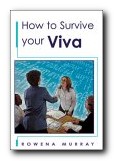defending a thesis in an oral examination
This is the first book of its type (in the UK) to focus entirely on this one short but vital part of the PhD process. It’s a vital stage in gaining your degree, yet most people make surprisingly little preparation for it. Rowena Murray starts off with a look over research on the viva in an attempt to learn what we know about what goes on ‘behind closed doors’. The answer is that we don’t know a lot, which is her justification for writing the book. How to Survive your Viva gets straight down to defining the viva and its purpose – which is not as easy as it might seem, because practice varies from one institution to another, and the process is often shrouded in secrecy.
 She makes this even more scary by pointing to the reason: there isn’t even a set of universally agreed criteria for what constitutes a successful PhD. Her advice is grounded in experience, and is perfectly sound. For instance, on the common occurrence of ‘pass subject to revisions’ which often seems so disappointing when candidates hear the words spoken, she offers this reassurance:
She makes this even more scary by pointing to the reason: there isn’t even a set of universally agreed criteria for what constitutes a successful PhD. Her advice is grounded in experience, and is perfectly sound. For instance, on the common occurrence of ‘pass subject to revisions’ which often seems so disappointing when candidates hear the words spoken, she offers this reassurance:
The viva is built up to be ‘the end’ of the doctoral process, but in reality the doctorate does not end with the viva. There is almost always some more work to do… Since the most common outcome is a pass with revisions and/or corrections, then you are not quite finished. Nor is it the end of the world if you have to do some more work; most people do. Do not, therefore, let the stakes get too high, so that it will seem like the end of the world if you have more work to do. Do not do that to yourself.
When it comes to preparing for the viva, she offers an amazingly thorough checklist of questions to ask your institution. These range from ‘Can I have a copy of the university’s code of practice on the conduct of the doctoral examination?’ to ‘Can I have a copy of the examiner’s form to be used in my viva?’
Students have far more extensive ‘consumer powers’ these days, and you have every right to ask for such information. You will certainly be much better prepared with it in your possession.
Her next chapter offers a timetable of what to do in the last few weeks leading up to the event, followed by how to handle the different types of questions likely to be raised in the interview, including what to do if you get stuck or flummoxed.
There is even a whole chapter on answering questions, striking the right attitude, responding to challenges, and even doing presentations. She also recommends mock vivas, shows you how to cope with the revisions, and how to recover from the whole experience afterwards.
My own PhD viva had some bad moments because I invited an extra examiner who didn’t really need to be there – and he decided to make waves (because he had no personal investment in the process). If I had read this book first, I wouldn’t have made that mistake. It’s a crucial moment in your academic career. The price of a book like this will repay itself a hundredfold in your first year of subsequent employment.
© Roy Johnson 2009
Rowena Murray, How to Survive your Viva, Maidenhead: Open University Press, 2009, pp.208, ISBN: 0335233821
More on study skills
More on writing skills
More on online learning